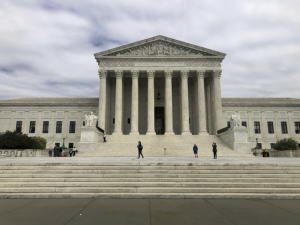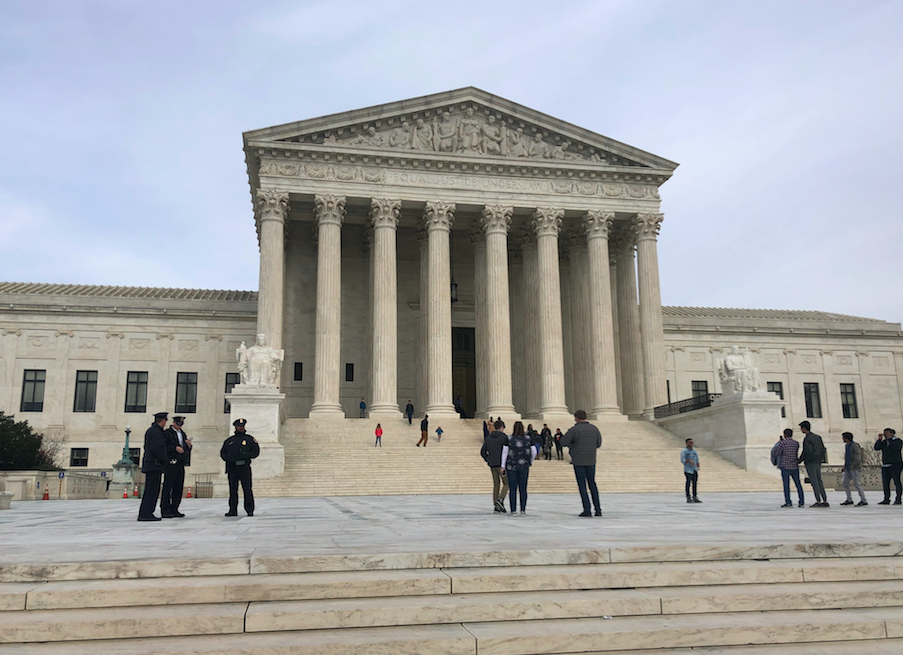Ginsburg’s passing illuminates impact of role models, need for continuous determination

I was 12 when I first found out who Ruth Bader Ginsburg was. I went to the Women’s March in Washington D.C. with my mom after President Trump had been sworn into office. Here, signs with quotes of empowerment and handmade drawings representing people’s feelings of protest engulfed the entirety of the National Mall and streets surrounding it. It felt like every tenth poster I saw had to do with Justice Ginsburg. Very quickly, I went from not knowing who she was to being inspired by her political wit and powerful dissent speeches.
Justice Ginsburg, who had served on the U.S. Supreme Court since 1993, died at the age of 87 from metastatic pancreatic cancer on Sept. 18. She was the second woman to serve on the court, which in itself is iconic; however, what set Justice Ginsburg apart from every other political servant, in my eyes, was her willingness to stray from the status quo of the Supreme Court and continually offer her dissent when the court ruled in a way that she deemed unjust, illustrating her robust political will.
It was this honesty that helped to show me that politics were, in fact, cool. As pathetic as that sounds, I was a middle schooler at the time who wasn’t interested in much more than television shows and Musical.ly.
When we studied government in class, none of the politicians looked like me and they definitely weren’t what I would deem to be exciting. It wasn’t until 2016, when Hillary Clinton ran for president, that my passion for politics grew.
But learning more about Justice Ginsburg was my political enlightenment.
Some teenagers look up to basketball players or singers, but I looked up the Notorious RBG. The climate of Bedford Middle School wasn’t one where many students were openly excited about politics, yet my friends and I worshipped Justice Ginsburg. We watched the documentary, RBG, time and time again, covered our desks with stickers that read silly sayings like “You can’t spell truth without Ruth” and kept RBG “judge-mints” in our backpacks.
While I often don’t subscribe to the mindset that those involved in government should be considered celebrities or pop culture icons, Justice Ginsburg helped to show young women, in particular, the power of political engagement, and that is an indescribable contribution.
In my eyes, Justice Ginsburg epitomized what upholding democracy looked like. She continually fought for gender equality and in doing so, defended my personally-held American ideals. Since the beginning of her career when she wrote the Reed v. Reed case until the final years of her career when she voted in favor of women’s abortion rights in the Stenberg v. Carhart case, she was a steadfast advocate for gender equality.
That being said, my view of Justice Ginsburg is one of privilege. I don’t defend her calling Colin Kapernick’s protests for racial equality “dumb and disrspectful,” and I don’t think that it is appropriate to say every decision she made in court was the correct one. However, only focusing on this part of her career would not only be an erasure of her tremendous fight for equality in the judicial branch, but it dismisses the impact she has had on so many of the lives of aspiring politicians.
Now, as I reflect on what Justice Ginsburg’s passing really meant to me, I am left with one recurring lesson that she taught me — never let anyone else’s expectations get in the way of your own goals. From the time Justice Ginsburg began college, she had to fight to prove her worth every step of the way, and that is what her legacy ultimately means to me. In times of hardship, you must continue to fight for what you know is right.
Justice Ginsburg showed me that justice will prevail if your will to fight never weakens.
Rest in power, RBG.

Editor-in-Chief Katie Simons ’22 has found her niche in the field of journalism, her interest blooming at a young age.
“Growing up, my dad had...












































![[Feb. 2017 Arts] Ruth Bader Ginsburg’s autobiography reveals the mundane side of American politics](https://www.inklingsnews.com/wp-content/uploads/2017/02/w-w-crown.jpg)





